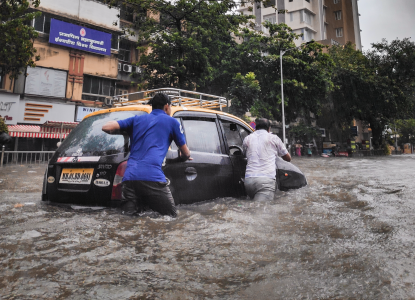By JoAnne Wadsworth, Communications Consultant, G20 Interfaith Forum
– – –
On August 10th, 2023, the G20 Interfaith Forum, in cooperation with Purdue University Fort Wayne and the International Academy for Multicultural Cooperation (IAMC), held a webinar entitled “Providing Refuge for Climate Refugees in International Law.”
Speakers included Cynthia Juarez Lange, a thought leader in global mobility programs with over 30 years’ experience in immigration law; Shahin Ashraf, Head of Advocacy at Islamic Relief Worldwide; Itza Castañeda, Equity Director for the World Resources Institute (WRI – Mexico); and Frances Namoumou, Programmes Manager for Ecological Stewardship and Climate Justice at the Pacific Conference of Churches. Dr. Sherrie M. Steiner, Professor at Purdue University Fort Wayne and Member of the IF20 Environment Working Group, moderated the discussion.
Sherrie Steiner began the webinar by welcoming all participants and audience members and giving a brief overview of the G20 Interfaith Forum mission. She then provided some context surrounding the topic at hand:
“Where do people go if their entire country vanishes or becomes uninhabitable? Today, no nation has provided asylum to climate migrants. They have no protection under refugee law, and countries are understandably reticent to add another pathway when systems are already strained. However, as many as 48 island nations will be swallowed by the ocean by 2100. Up to 12% of the world population will potentially be displaced by climate change in the future.”
She said that the International Court of Justice has been asked to address the issue, and though an opinion would not be legally binding, it would carry significant weight in circles of international law.
She then invited each of the panelists to offer some comments on the situation.
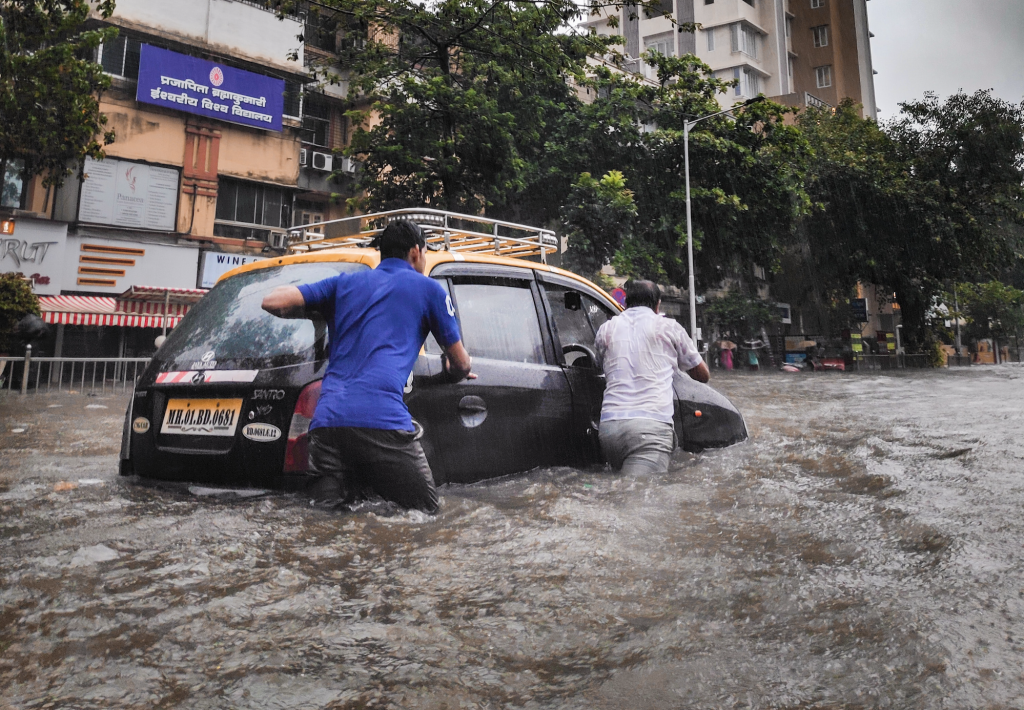
Cynthia Lange
Lange focused her comments on clarifying legal terminology and its implications, saying that though the term “climate refugee” is commonly used to raise awareness, it is not a term recognized in international law.
“Refugees are defined as people who have fled violence, war, or persecution in their home country and crossed a border –and unable to return to their home country for a well-founded fear of being persecuted due to various reasons (race, religion, nationality, membership in a particular social group or political opinion). Non-refoulement policies define host countries’ responsibilities toward refugees and refugee responsibilities to host countries. This does not cover individuals in search of better living conditions or those fleeing natural disasters. And expanding this definition “waters down” the current one, putting true refugees in danger.”
She said that movement in response to climate change is a normal human behavior, and extensive study of climate displacement predicts that the numbers of people in this situation are only going to increase. However, the International Organization for Migration (IOM) has defined these people as migrants—a broader definition that encompasses all versions of this type of movement.
Unlike refugees, who enjoy a range of legal protections and rights based on their status, climate migrants lack documentation, legitimacy, the right to work, good healthcare access, and more.
Lange said it is probably politically impossible in current conditions to achieve a status for climate migrants similar to refugee status, as even many who are fighting for migrant rights give priority to preserving and strengthening existing rights rather than renegotiating definitions and risking losing ground.
“Whatever terms we use, what is needed is a clear legal standard that would allow these people to live and work in their host countries.”
Itza Castañeda
Castañeda focused her remarks on the intersection of gender considerations and the climate migration experience. She said climate change exacerbates poverty and vulnerability for women because of gender-based discrimination in livelihoods, land and natural resources, financial resources, and more.
A few existing frameworks, however, address the linkages between gender, climate, and migration, and offer windows of legal opportunity:
- Committee on the Elimination of Discrimination Against Women, Recommendation 37
- Looks at gender-related dimensions of disaster risk reduction in the context of climate change. They’re also vulnerable to climate change in destination countries.
- Global Compact for Safe, Orderly and Regular Migration, Objective 2
- Looks at concrete actions to address natural disasters and other adverse effects in the context of migration. Implementing it in a gender-responsive manner could help.
- UNFCCC Paris Agreement
- Parties should remember (among other things) the rights of migrants and gender equality.
- The Glasgow Climate Pact
- Greater support and financing for gender-responsive climate action (full, meaningful and equal participation of women in climate action)
She said challenges to ensuring safe and regular migration for women and girls in the context of climate change include getting national and state governments, agencies, and social organizations to implement these policies in their entirety—along with investing in better data and statistics to support evidence-based policies and programs.
Her recommendations included the following:
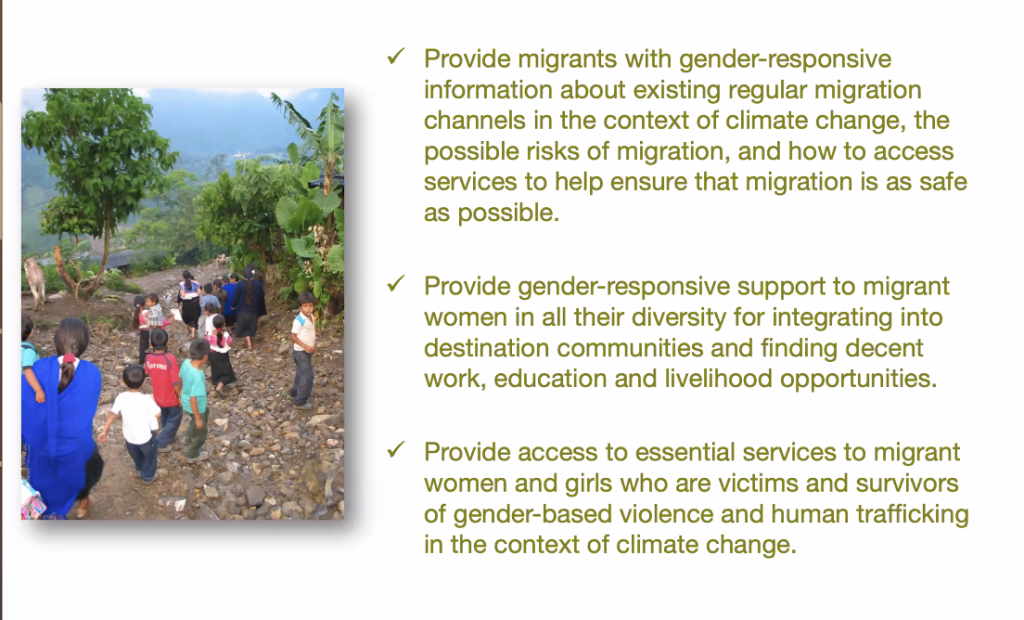
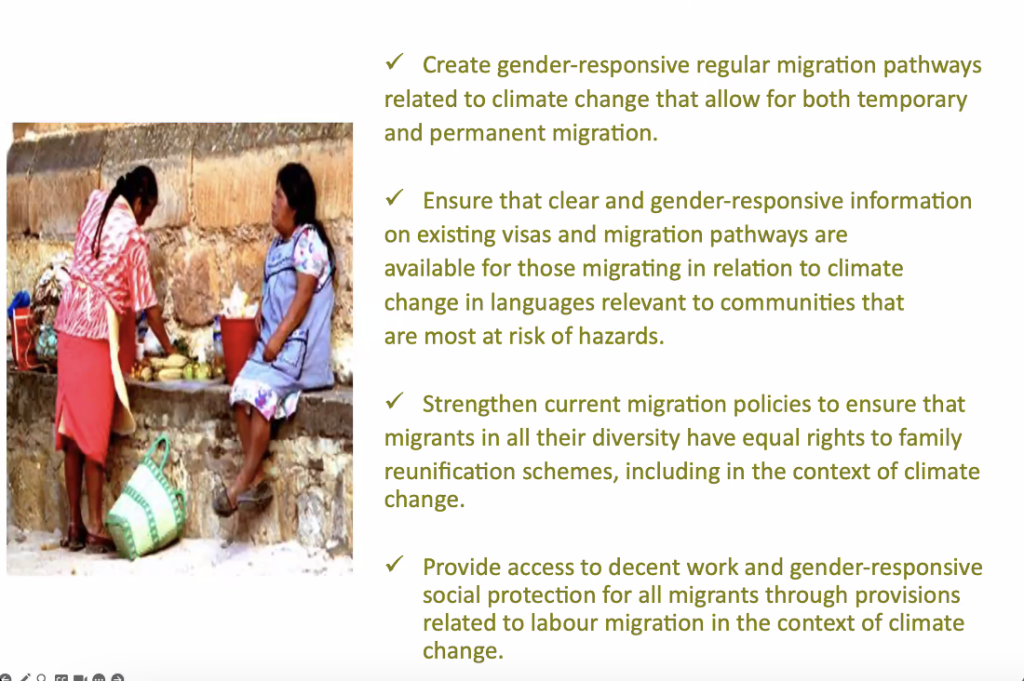
Frances Namoumou
Namoumou focused her comments on planned relocation efforts in vulnerable Pacific Island communities, utilizing examples from her home country of Fiji.
She said people are having to leave the land they’ve used as their homes for generations—but because it’s become such a risk, even though relocation is the last resort, once they’re away from danger, they’re finally able to sleep well.
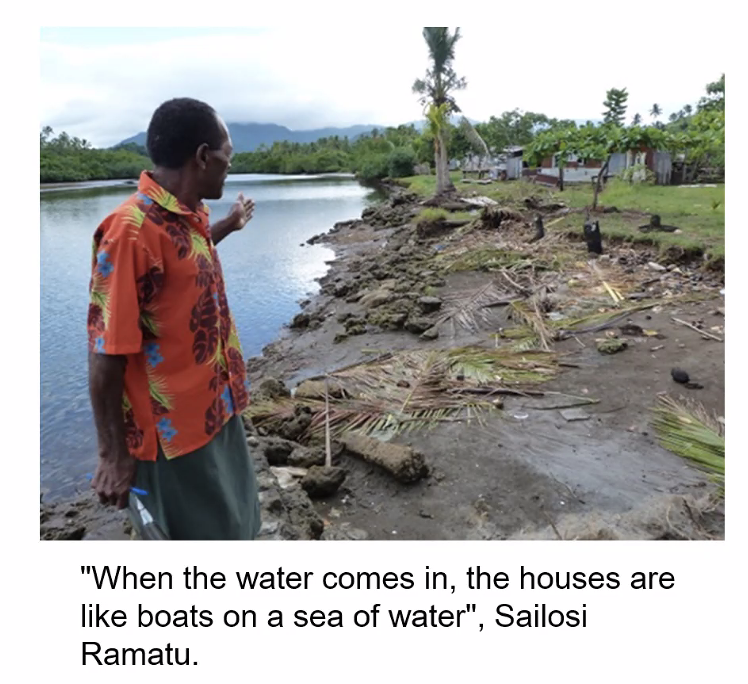
Relocation of a village only happens when 90% of the people in the village agree to it—then the Fijian government agrees to help. However, other issues compound on existing ones. In one village, there were no kitchens built into the relocation homes, serving as a reminder to remember women’s rights in climate issues. In another, tropical cyclone Harold destroyed relocation homes as they were being built, showing that the natural disasters villagers are facing aren’t limited to just rising sea levels.
Relocation also brings the challenge of marrying native heritage to the new lifestyles of host countries—which leaves many Pacific Islanders reluctant to move.
Shahin Ashraf
Ashraf focused her remarks on the role of faith communities in the crisis. She said the gap needs to be bridged between discourse and action, and recent stark realities around environmental upheaval and migration should press us to look deeper and do more.
“We need to look not just at legal intricacies, but at the fundamental values we’re basing our lives on. We need to pave the way for a more inclusive and compassionate response. It is our responsibility to ensure that everyone’s rights are upheld and protected.”
She said that as the global community grapples with ethical and legal perspectives on this issue, faith communities have a critical role to play in extending compassion, justice, and mercy. All religions include concepts of justice and mercy, solidarity, stewardship of planet, and protection of human dignity. Therefore, the voices of faith communities and their advocacy are pivotal in advocating for just policies, creating welcoming spaces and sanctuaries, and providing moral guidance and narratives—inspiring their followers to provide aid, compassion, and help.
“As we navigate this nuanced terrain within the context of faith and international law, we are presented with an extraordinary opportunity to bridge divides. By tapping into the wisdom of our teachings and shared humanity, we can create a path built on values that both our religious beliefs and international law cherish.”
Conclusion
In conclusion, Steiner thanked participants for their insights and invited all attendees to continue the discussion in their local communities and spheres of influence. Watch the full recording of the webinar below.
– – –
JoAnne Wadsworth is a Communications Consultant for the G20 Interfaith Association and acting editor of the “Viewpoints” blog.


